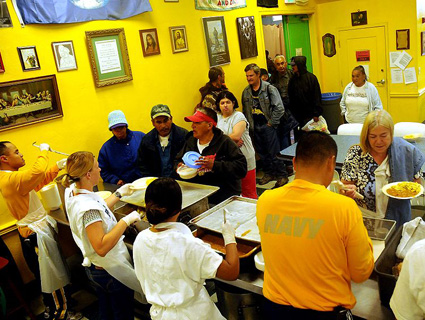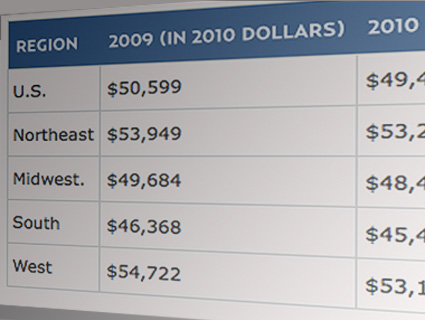
A soup kitchen in Salinas, California.<a href="http://en.wikipedia.org/wiki/File:US_Navy_090806-N-6220J-004_Sailors_and_Navy_Delayed_Entry_Program_members_serve_breakfast_to_homeless_men_and_women_at_Dorothy%27s_Soup_Kitchen_in_Salinas,_Calif._during_Salinas_Navy_Week_community_service_event.jpg">US Navy photo by Chief Mass Communication Specialist Steve Johnson</a>/Wikimedia
This post first appeared on the ProPublica website.
Last month, we detailed the dismal state of the nation’s economy. Now that the Census Bureau has released new poverty figures, we wanted to give you another snapshot of how Americans are faring more than two years after the recession.
Americans below the poverty line in 2010: 46.2 million
Official US poverty rate in 2007, before the recession: 12.5 percent
Poverty rate in 2009: 14.3 percent
Poverty rate in 2010: 15.1 percent
Last time the poverty level was this high: 1993
Poverty line in 2010: $22,314 for a family of four, or $11,139 for an individual
Rough amount the poor are living on per week: $200 or less
Poverty rate in American suburbs: 11.8 percent, the highest since 1967
Percentage of the population making less than half the poverty line in 2010: 6.7 percent
Percentage of the population making less than half the poverty line in 2007, before the recession: 5.2 percent
Poverty rate for white Americans in 2010: 13 percent
Poverty rate for African-Americans in 2010: 27.4 percent
Real median household income in 2010: $49,445
Decline in median household income since 2009: 2.3 percent
Decline in median household income since before the recession: 6.4 percent
The last time median household incomes have been this low: 1996
Real median household income in 1999, in 2010 dollars: $53,252
Median income for full-time male workers in 2010: $47,715
Median income for full-time male workers in 1973, in 2010 dollars: $49,065
Official unemployment rate in August 2011: 9.1 percent
Total unemployed people in August: 14 million
People who were employed part-time for economic reasons in August 2011: 8.8 million
People not counted in the labor force who wanted work: 2.6 million
Net jobs created in August 2011: 0
Long-term unemployed people as of August 2011: 6 million
Unemployed workers per job opening as of July 2011: 4.34 (3.2 million openings and 13.9 million unemployed people)
Uninsured Americans in 2010: 49.9 million
Percentage of Americans without health insurance in 2010: 16.3 percent
Percentage of Americans without health insurance in 2007, before the recession: 15.3 percent
Percentage of children who were uninsured in 2010: 9.8 percent
Percentage of children in poverty who were uninsured in 2010: 15.4 percent
Percentage of American households that had enough to eat throughout the year in 2007: 88.9 percent
Percentage of American households that had enough to eat throughout the year in 2010: 85.5 percent







